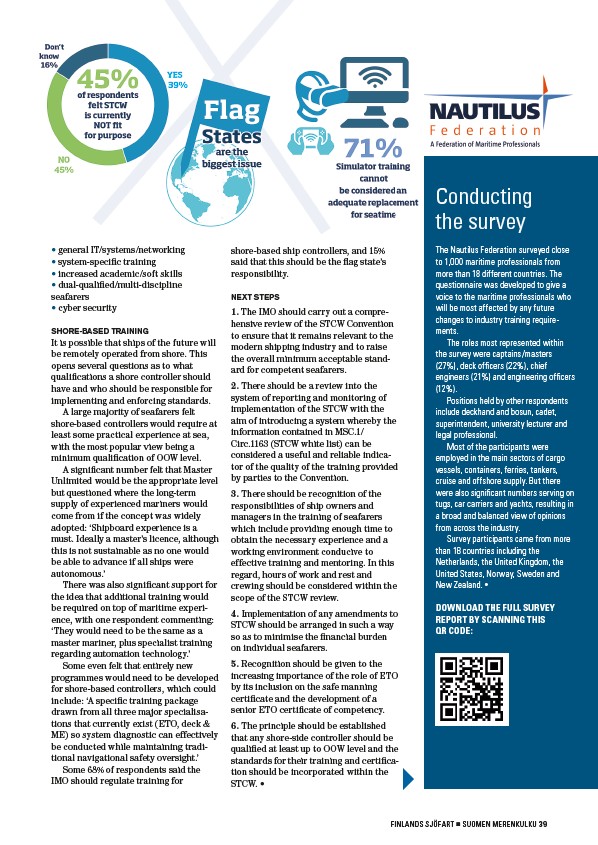
A
Conducting
the survey
The Nautilus Federation surveyed close
to 1,000 maritime professionals from
more than 18 different countries. The
questionnaire was developed to give a
voice to the maritime professionals who
will be most affected by any future
changes to industry training require-ments.
The roles most represented within
the survey were captains/masters
(27%), deck officers (22%), chief
engineers (21%) and engineering officers
(12%).
Positions held by other respondents
include deckhand and bosun, cadet,
superintendent, university lecturer and
legal professional.
Most of the participants were
employed in the main sectors of cargo
vessels, containers, ferries, tankers,
cruise and offshore supply. But there
were also significant numbers serving on
tugs, car carriers and yachts, resulting in
a broad and balanced view of opinions
from across the industry.
Survey participants came from more
than 18 countries including the
Netherlands, the United Kingdom, the
United States, Norway, Sweden and
New Zealand. •
DOWNLOAD THE FULL SURVEY
REPORT BY SCANNING THIS
QR CODE:
FINLANDS SJÖFART J SUOMEN MERENKULKU 39
• general IT/systems/networking
• system-specific training
• increased academic/soft skills
• dual-qualified/multi-discipline
seafarers
• cyber security
SHORE-BASED TRAINING
It is possible that ships of the future will
be remotely operated from shore. This
opens several questions as to what
qualifications a shore controller should
have and who should be responsible for
implementing and enforcing standards.
A large majority of seafarers felt
shore-based controllers would require at
least some practical experience at sea,
with the most popular view being a
minimum qualification of OOW level.
A significant number felt that Master
Unlimited would be the appropriate level
but questioned where the long-term
supply of experienced mariners would
come from if the concept was widely
adopted: ‘Shipboard experience is a
must. Ideally a master’s licence, although
this is not sustainable as no one would
be able to advance if all ships were
autonomous.’
There was also significant support for
the idea that additional training would
be required on top of maritime experi-ence,
with one respondent commenting:
‘They would need to be the same as a
master mariner, plus specialist training
regarding automation technology.’
Some even felt that entirely new
programmes would need to be developed
for shore-based controllers, which could
include: ‘A specific training package
drawn from all three major specialisa-tions
that currently exist (ETO, deck &
ME) so system diagnostic can effectively
be conducted while maintaining tradi-tional
navigational safety oversight.’
Some 68% of respondents said the
IMO should regulate training for
shore-based ship controllers, and 15%
said that this should be the flag state’s
responsibility.
NEXT STEPS
1. The IMO should carry out a compre-hensive
review of the STCW Convention
to ensure that it remains relevant to the
modern shipping industry and to raise
the overall minimum acceptable stand-ard
for competent seafarers.
2. There should be a review into the
system of reporting and monitoring of
implementation of the STCW with the
aim of introducing a system whereby the
information contained in MSC.1/
Circ.1163 (STCW white list) can be
considered a useful and reliable indica-tor
of the quality of the training provided
by parties to the Convention.
3. There should be recognition of the
responsibilities of ship owners and
managers in the training of seafarers
which include providing enough time to
obtain the necessary experience and a
working environment conducive to
effective training and mentoring. In this
regard, hours of work and rest and
crewing should be considered within the
scope of the STCW review.
4. Implementation of any amendments to
STCW should be arranged in such a way
so as to minimise the financial burden
on individual seafarers.
5. Recognition should be given to the
increasing importance of the role of ETO
by its inclusion on the safe manning
certificate and the development of a
senior ETO certificate of competency.
6. The principle should be established
that any shore-side controller should be
qualified at least up to OOW level and the
standards for their training and certifica-tion
should be incorporated within the
STCW. •